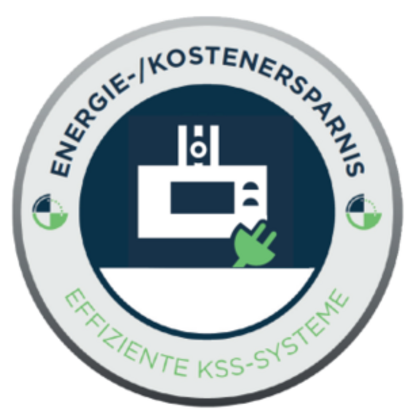Coolant Audit M2: Saving Energy

Objective
to reduce your lubricoolant-related energy costs
Description
We show you the places in your machine tool where you are using excessive lubricoolant and calculate the savings potential you could achieve.
Every litre of lubricoolant that you save also saves you the energy required for lubricoolant cooling, filtration etc. This is all money you can save!
Benefits to you
- Reduction in
- > Energy consumption
- Lubricoolant volume
- Lubricoolant costs
- < Filtration load
Scope of audit
- Recording of existing lubricoolant system
- > Lubricoolant nozzles and exits
- Pressures and volume flows
- Pump rate and pipework
- Feed systems, cycles/needs
- Process settings
- < Supply network geometries, components
- Consumption profile
- > Pumps (kWh)
- < Lubricoolant (pressure/volume) per cycle
- ACTUAL - current lubricoolant situation
- Savings potential
- > Lubricoolant (€ per l/min)
- < Energy (kWh))
- TARGET - optimal lubricoolant situation
- Offers for grindaix retrofit packages (nozzles, pumps, optimised settings)
Planen Sie Ihr Audit!
Gerne beraten wir Sie ausführlicher zu Ihrem gewünschten Thema. Bitte senden Sie einfach eine unverbindliche Anfrage an info@grindaix.de, wir setzen uns schnellstmöglich mit Ihnen in Verbindung.
Our Machine Tool Audits
Our Filtration Audits
Procedure for a Coolant Audit M
1 Visit to your production environment
Our technicians visit you with all the necessary measurement equipment. Within a very short space of time (approx. 3h/machine), the periphery inside the machine is recorded.
2 Measurement of flow rates
By means of state-of-the-art measurement technology, we check the current lubricoolant flow rate per line. Depending on the audit, we also monitor all scenarios of your production process.
3 Recording supply pipes and fixtures
All pipes are completely recorded – from the lubricoolant supply connection to all nozzle exits. All geometrical and type values are also logged.
4 Analysis and evaluation of waste
We demonstrate how machining sites may be supplied in a robust way to meet the highest productivity demands, and how all waste in secondary zones may be avoided.
